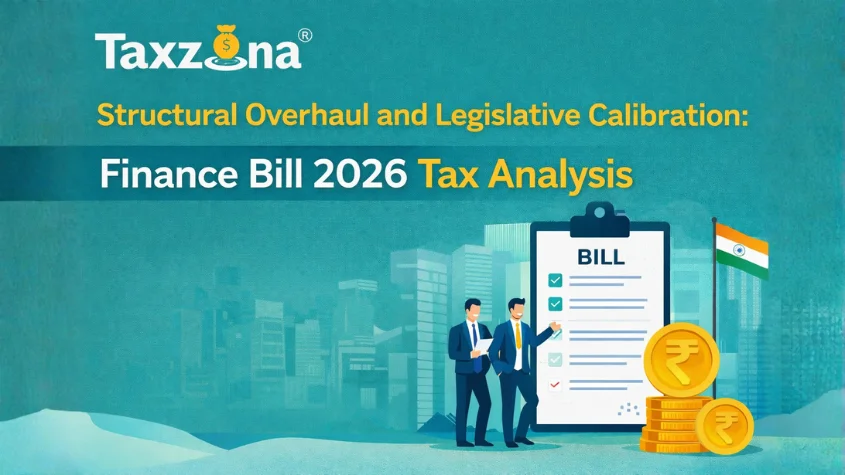
Kerala HC Strikes Down GST on Clubs & Associations: IMA Case
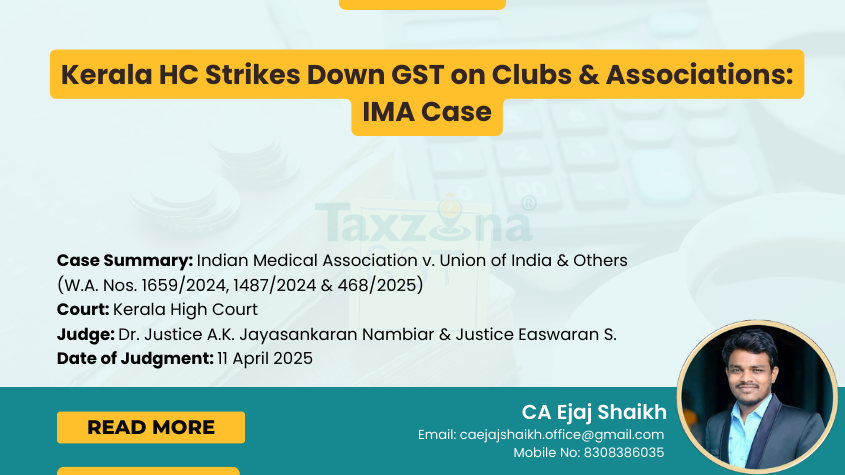
1. Issue Involved
This case revolved around the following key constitutional and tax law issues:
- Constitutional Validity of GST Provisions:
Whether Section 2(17)(e), Section 7(1)(aa) and the Explanation thereto under the CGST Act, 2017 and KGST Act, 2017 — which deem that services provided by a club/association to its members constitute “supply” — are constitutionally valid.
- Principle of Mutuality:
Whether services provided by a mutual organisation like the Indian Medical Association (IMA) to its own members can be taxed under GST, considering the long-standing principle of mutuality that treats the club and its members as a single entity.
- Retrospective Effect of Amendment:
Whether the retrospective application of the said deeming provision from 01 July 2017 (the date of GST implementation) violates the Constitution, particularly Articles 14, 19(1)(g), 265, and 300A.
Facts of the Case
1. The Indian Medical Association, Kerala State Branch (IMA KSB), a non-profit body of medical professionals, operates numerous mutual benefit schemes exclusively for the welfare of its members, such as:
- Social Security Schemes (SSS-I, II & III): Provide financial assistance to families of deceased doctors or those who suffer permanent disability.
- Professional Disability Support Scheme (PDSS): Offers assistance to members who are temporarily or permanently disabled.
- Professional Protection Scheme (PPS): Covers legal expenses and compensations for professional negligence cases against members.
- Kerala Health Scheme: Helps members and their families with financial assistance for medical treatments.
- Pension Scheme: Offers pensions to life members.
- Mutual Benefit Scheme & Patient Care Scheme: Encourage savings and assist poor patients.
2. These schemes were funded solely by member contributions, operated on the basis of mutual understanding, and were not designed to generate profits or offer services to non-members.
2. In 2023, the Directorate General of GST Intelligence issued summons to IMA KSB demanding:
- GST registration details
- Audited financial records from FY 2017-18 to 2021-22.
4. IMA apprehended coercive recovery actions and filed a Writ Petition (W.P.(C) No. 21297/2023) in the Kerala High Court seeking:
- Declaration that the deeming provisions in Section 7(1)(aa) and Section 2(17)(e) are unconstitutional.
- Restraining the authorities from any coercive GST action.
5. The writ petition was partly allowed by a single judge:
- The provisions were held valid, but
- Their retrospective effect from 01.07.2017 was struck down.
6. Aggrieved, IMA filed a Writ Appeal (W.A. No. 1659/2024) against the upholding of the validity of the provisions.
7. The Union of India, State of Kerala, and GST officers filed Writ Appeals (W.A. Nos. 1487/2024 and 468/2025) against the part of the judgment that struck down the retrospective effect.
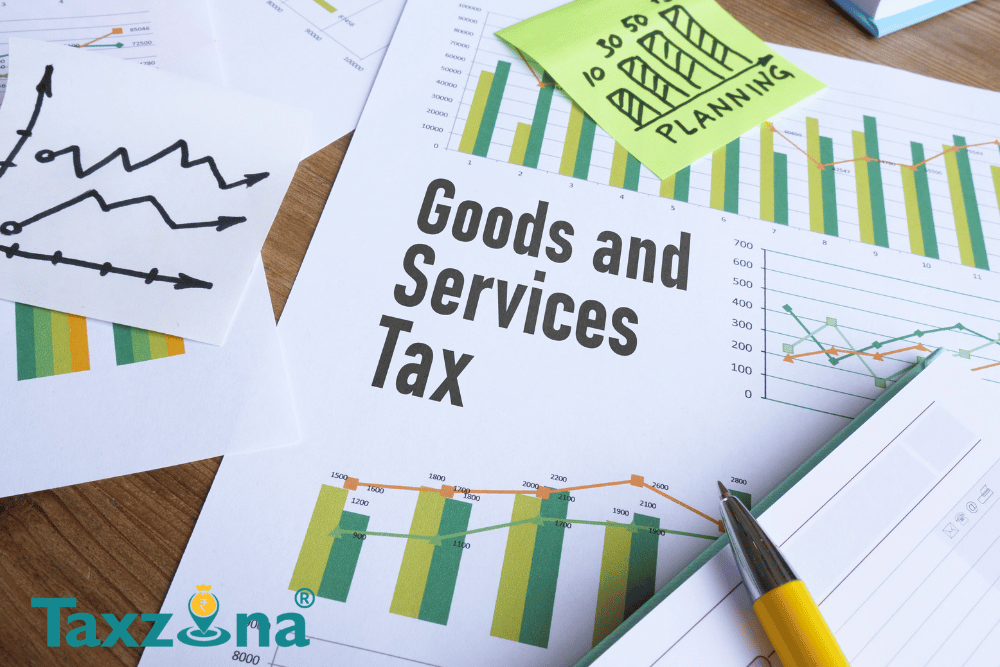
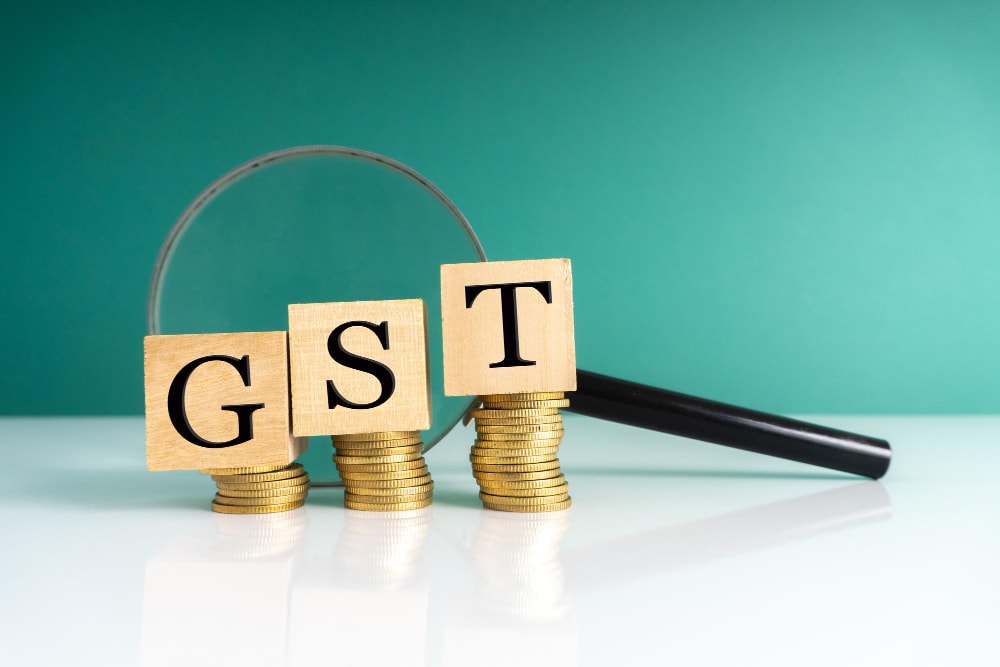
3. Observations of the Court
The Division Bench undertook a deep constitutional and legal analysis and made the following critical observations:
- Doctrine of Mutuality Remains Intact:
- The Court reaffirmed the well-established legal doctrine of mutuality, which holds that:
“An entity cannot make a supply to itself. A club or association and its members are not two separate persons; hence, there is no transaction involving two distinct parties that could amount to a taxable supply.”
- The Court relied on the Supreme Court ruling in Calcutta Club Ltd. (2019) which held that mutual associations are insulated from service tax and VAT because there is no “supply” between separate persons.
- Overreach of Legislative Power Under Article 246A:
- Article 246A, introduced by the 101st Constitutional Amendment, grants Parliament and State Legislatures the power to make laws regarding tax on supply of goods or services.
- However, the Court held that this power must be exercised within the constitutional framework, and cannot override settled legal doctrines without express constitutional backing.
- The Finance Act, 2021 inserted:
- Section 7(1)(aa) in the CGST Act
- An Explanation stating that a club and its members will be deemed distinct persons
- Section 2(17)(e) including such activity in “business”
- These provisions created a legal fiction that overrides the principle of mutuality, treating clubs and members as separate legal entities without constitutional authority to do so.
- The Court found this fiction to be a colourable piece of legislation, i.e., a legislative device to override judicial decisions (especially Calcutta Club) without amending the Constitution.
- Retrospective Taxation is Unjust and Confiscatory:
- The Court held that making these provisions applicable retrospectively from 01 July 2017:
- Was not foreseeable by clubs like IMA
- Created substantial financial liability
- Was confiscatory and violated principles of fairness
- The amendment could not be justified as merely clarificatory, as it materially altered the taxability of these transactions and introduced a new taxable event.
4. Judgment of the Court
The Kerala High Court struck down the entire deeming provision, not just its retrospective application.
The Court declared: “Accordingly, the provisions of Section 2(17)(e) and Section 7(1)(aa) and the Explanation thereto of the CGST Act, 2017 and the provisions of Section 2(17)(e) and Section 7(1)(aa) and the Explanation thereto of the KGST Act are declared as unconstitutional and void, being ultra vires the provisions of Article 246A read with Article 366(12A) and Article 265 of the Constitution of India.”
Thus, the Court:
- Invalidated the deeming fiction prospectively and retrospectively
- Reinstated the protection under the mutuality principle
- Held that IMA and similar associations are not liable to pay GST on services rendered to their members
5. Case References Cited by the Court
- Calcutta Club Ltd. v. State of West Bengal, (2019) 19 SCC 107
– Upheld mutuality; supply to self not taxable - JCTO v. Young Men’s Indian Association, (1970) 1 SCC 462
– No taxable supply between a club and its members - Ranchi Club Ltd. v. Chief CCE & ST, (2012) 51 VST 369
– Mutuality applies under service tax regime - Gannon Dunkerley & Co. v. State of Madras, AIR 1958 SC 560
– Constitutional terms cannot be altered by statute - Jayam & Co. v. Assistant Commissioner, (2016) 15 SCC 125
– Retrospective amendments that impose new burdens are unconstitutional - Star India Pvt. Ltd. v. CCE, (2005) 7 SCC 203
– No interest if tax was not payable earlier - Exide Industries v. Union of India, (2020) 5 SCC 274
– Parliament can remove the basis of judgment by law, but not beyond constitutional bounds.
6. Key Learnings from the Judgment
- Clubs and members are not separate persons for GST purposes unless the Constitution is amended to say so.
- Statutory amendments cannot override constitutional doctrines like mutuality.
- Legal fictions created by Parliament must operate within the constitutional framework.
- Retrospective tax laws, if they impose new liabilities without notice or opportunity to comply, can be struck down as unconstitutional.
This judgment re-establishes constitutional supremacy over fiscal statutes, especially where settled legal positions are disturbed without due process.
7. Conclusion
This judgment is a landmark interpretation of GST law in light of constitutional principles. The Kerala High Court:
- Reinforced the principle of mutuality
- Held that clubs and associations are not liable to pay GST for services to their members
- Struck down the deeming provisions of the CGST and KGST Acts as unconstitutional
The verdict is a significant relief to member-driven organizations, protecting them from both retrospective tax demands and future taxability, unless a constitutional amendment permits otherwise.
Recent Post

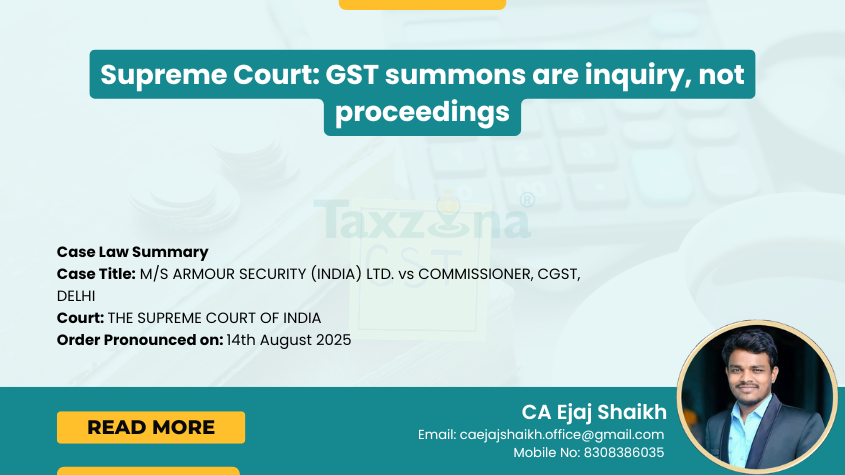
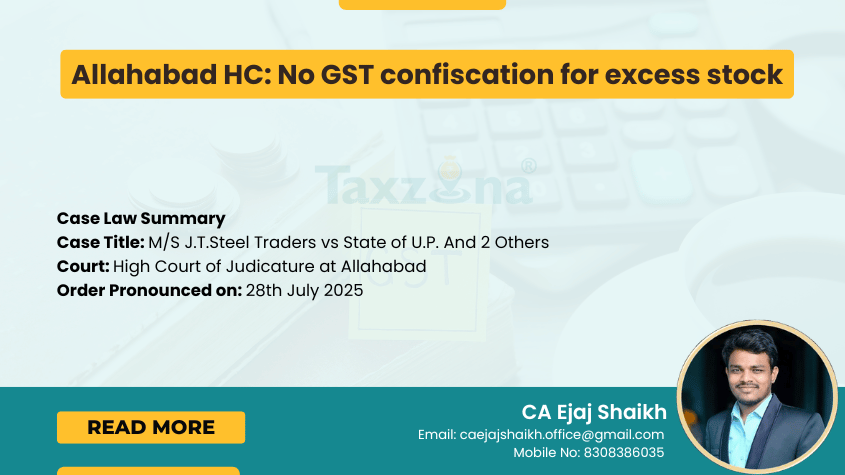
Have Any Question?
Our experts at Taxzona are here to help you with GST, Income Tax, and all your financial queries. Get reliable guidance tailored to your business and personal needs.

